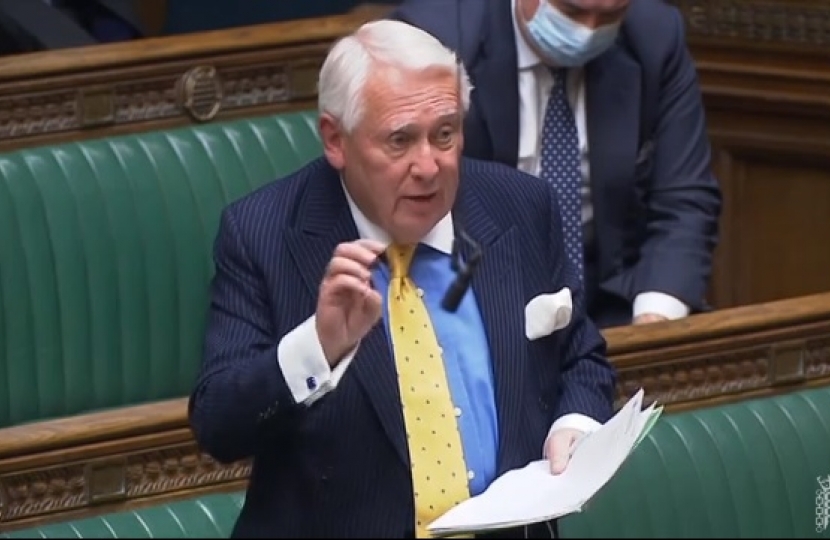
Throughout the pandemic I have advocated a proportionate, evidence-based response to COVID-19. In my view that means, when the data shows no other option exists, putting in place the minimum restrictions necessary to contain the virus and ensure the NHS is not overwhelmed while being mindful that any measures must not unduly infringe upon our liberties, have too great an impact on access to frontline services, like education, or place an otherwise avoidable burden on businesses or do lasting damage to the health of the economy. As my voting record will demonstrate, on occasions, I think the Government has got that balance right, and at other times, I do not.
While I am firmly of the belief that, long-term, we need to learn to live with the virus, we should be in no doubt that Omicron poses a significant public health risk and is already having a considerable impact on the NHS. We are learning more about this new strain every day, but what we do know so far gives cause for concern. It is far more transmissible than previous variants, with cases continuing to double every two days, meaning more people needing treatment and less staff available to care for them. Indeed, the number of NHS employees in London who are off work due to either illness or self-isolation has increased by 40 per cent in just the last week. There is now a very real risk that the NHS could be overwhelmed, meaning impossible decisions would need to be made on who receives urgent medical treatment and who doesn’t. That’s why I believe additional measures are both necessary and unavoidable.
At the same time, early reports that the variant is less severe remain unsubstantiated (it may be the case that high exposure to previous waves account for the comparatively low hospitalisation rates we have seen in South Africa, which in any event, are beginning to rise). Data also shows that, unlike the Delta variant, two vaccine doses offer much lower levels of protection against symptomatic infection from Omicron. It is therefore vital that everyone plays their part and gets a booster jab. Over 25 million boosters have now been given across the UK, a record 745,183 of them yesterday, and it remains our best defence against COVID-19. If you have not done so already, you can book a slot here:
On Tuesday, MPs were asked to vote on three different measures the Government has brought forward. The first makes the wearing of face coverings mandatory in more indoor public settings. The scientific and medical consensus strongly supports the wearing of masks, the evidence shows that when compliance is high, masks are effective at reducing the spread of the virus, and I believe that for most of us, it is no great intrusion to wear one to help protect others. That is why I supported the Government.
The second vote was on regulations that require either proof of a negative lateral flow test, or double vaccination, to enter certain venues and events. Although many have labelled this a “vaccine passport”, the inclusion of a negative lateral flow test as an alternative does ensure the two-tier system I know a lot of people have been concerned about is avoided. While I believe we will have to keep all options on the table going forward, and strongly reject some of the rhetoric we have seen develop around this issue - which at times has been inflammatory, insensitive, and deeply distasteful – I voted against the regulations for a number of reasons.
If we are to bring in restrictions like this, which raise serious ethical and legal questions about our civil liberties, not to mention concerns around the practicality of their implementation, then they need to be consistent, properly targeted, and well evidenced. The Justice Committee, which I Chair, made clear similar concerns earlier this year that the use of £10,000 fixed penalty notices (FPNs) for offences under the COVID-19 regulations have been excessive and disproportionate when they are usually used for low-level offences like littering and graffiti.
Regrettably, I believe the regulations we considered on Tuesday were poorly drafted. Take, for example, the fact that this certification requirement will apply to indoor venues with over 500 people inside, but only if those people “are likely to stand and move around”, not sit, or the exemption for some venues until certain times of the night but not others. One of the lessons from the pandemic has been the need for clear messaging, and I also worry about the signal it sends if, on the one hand, we’re telling people that two doses does not provide adequate protection, and on the other, making it a requirement of entry to certain venues. The evidence suggests it will do little to reduce the spread of Omicron and I believe such restrictions should only be considered when the data shows they will be effective.
The final vote was on making vaccination a condition of deployment for all frontline health and social care workers. While again, this poses difficult ethical questions, on balance, given the position of responsibility these individuals are in, I believe it is a necessary step that will both protect patients, especially those that are vulnerable and require frequent face-to-face care, as well as support our hospital trusts, which continue to be impacted by a large number of staff absences. Vaccination became a condition of deployment in care homes on 11 November, and although 91 per cent of NHS staff have now had two doses, it is only fair that this rule is extended across the NHS too, where there is already a precedent for doing so (for example, that those undertaking exposure-prone procedures, like surgeons, be vaccinated against Hepatitis B). Of course, there is an exemption for those who cannot have a COVID-19 vaccine for medical reasons, and importantly, this requirement won’t come into force until Spring, giving those who have not yet received jabs time to come forward.
All of the measures we voted on must be reviewed by 5 January, and unless amended, will expire on 26 January. I continue to have very regular meetings with local health officials, including the South East London Clinical Commissioning Group (CCG), who I met again this morning, and will be doing everything I can to both feed in their concerns to central government and to ensure the booster programme operates smoothly and efficiently in our area. I am also pressing for the reintroduction of support for those industries that will be heavily impacted by these restrictions, including the hospitality sector, which has already been hit by a considerable number of cancellations. I know the same can be said for the travel and arts and cultural sectors too.
I will post further updates over the coming weeks.




